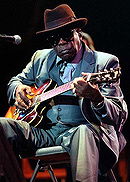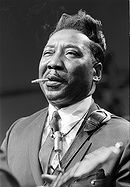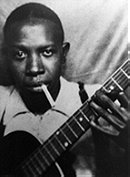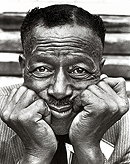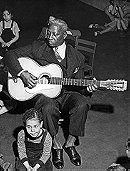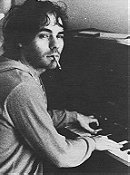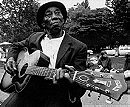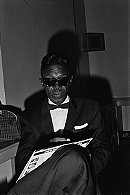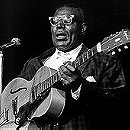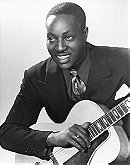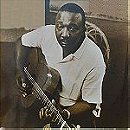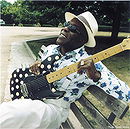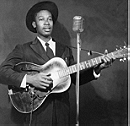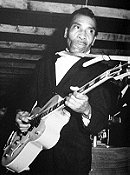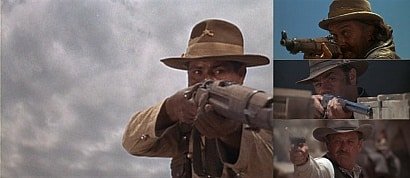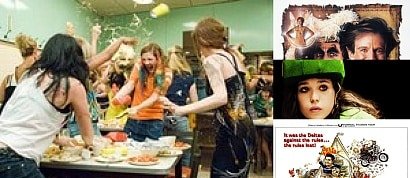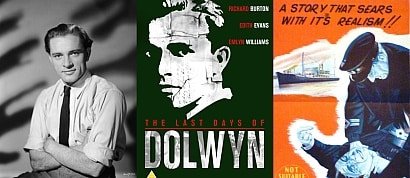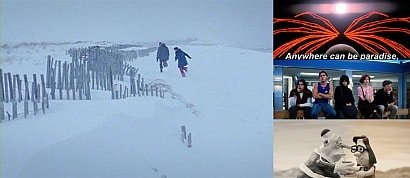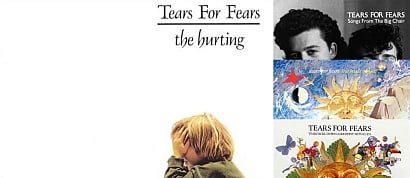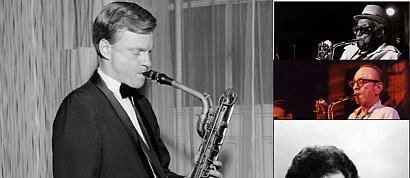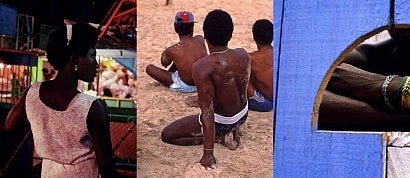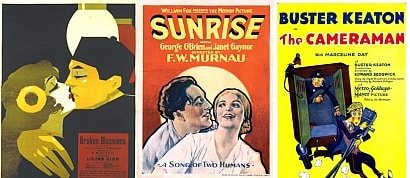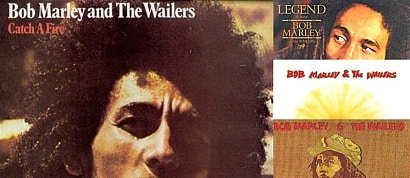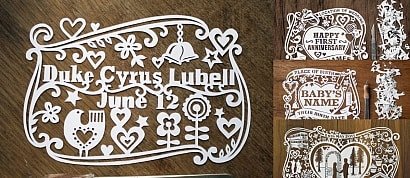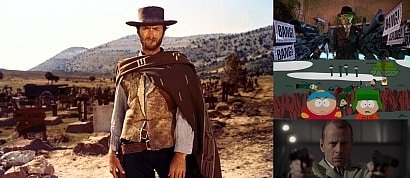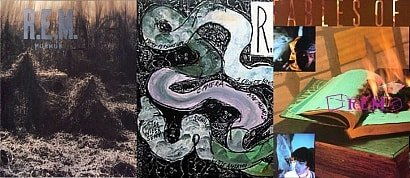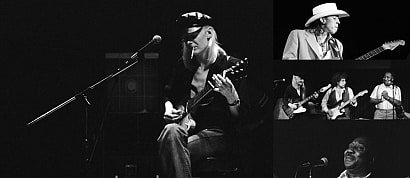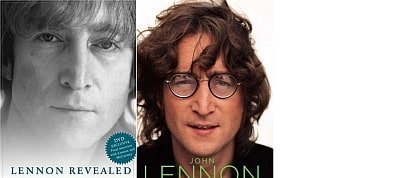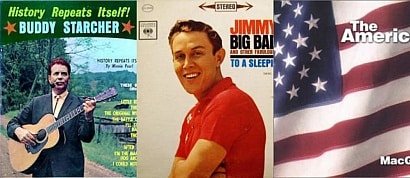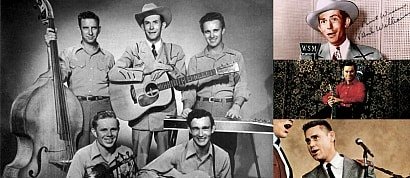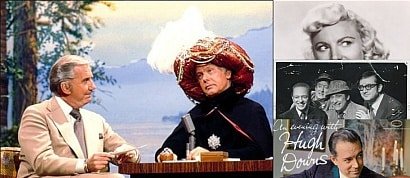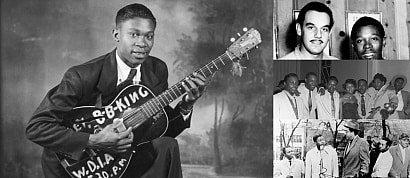Damn Right, I Got The Blues
Sort by:
Showing 19 items
Rating:
List Type:
 Add items to section
Add items to section
R L Burnside

R.L. (Robert Lee) Burnside — Born in Mississippi hill country back in 1926. Worked as a sharecropper, picked up the guitar as a young man, heavily influenced by bluesmen — Fred MacDowell, John Lee Hooker, Buddy Guy, and Muddy Waters (who was married to his first cousin). Burnside shook the Mississippi dust off his heels some time in the ’50s and headed for Chicago. Within a year, his Father, brother, and uncle were all murdered. He went back home to Mississipi where he ran into trouble himself — killing a man. ”I didn’t mean to kill nobody… I just meant to shoot the son of a bitch in the head. Him dying was between him and the Lord.” R.L. Burnside gained a huge following and critical acclaim finally in the ’90s when he teamed up with Jon Spencer, releasing the masterpiece — “A Ass Pocket of Whiskey.” Burnside died at the age of 78 in 2005. –Image by Jim Herrington

 Add items to section
Add items to section
John Lee Hooker

John Lee Hooker — Born in Mississippi, the youngest of 11 children, back in 1917 to a sharecropper family. His Daddy was also a preacher, and when he was just 4 yrs old, his parents split-up. His Mama married a bluesman, William Moore — a young Hooker took-up guitar, and credits his stepfather with being a major influence on him musically. With his own unique style of talking blues, infused with boogie-woogie, Hooker racked-up a string of hits — including“Boogie Chillen” (from 1948) and “Boom Boom” (from 1962), and my favorite John Lee Hooker tune is — “One Bourbon, One Scotch, One Beer.” John Lee Hooker passed away in 2001.


 Add items to section
Add items to section
Muddy Waters

Muddy Waters — Born McKinley Morganfield in Rolling Fork, Mississippi back in 1915. His Mama died when he was just 3 yrs old, and so he was raised by Grandmother in Clarksdale. Muddy started playing the harmonica at the age of 13, and a few years later picked-up the guitar. Muddy was very big on legendary Delta bottle-neck guitar masters — Son House and Robert Johnson. Soon, Muddy was a master himself — being one of the best guitarists and vocalists in the region – and now recognized as one of the best ever. In 1941, Alan Lomax and a team of Library of Congress field collectors visited and recorded Muddy Waters for the Library’s folksong archives (they were originally looking for Robert Johnson at the time, but had no idea that he had died three years earlier). Muddy finely-honed his blues chops in the tough, back country juke joints until 1943 — when he left for Chicago. Waters worked hard to make a name for himself, and by the 1950s, he had a string of recordings that solidified his reputation as one of the best. Numerous members of his bands through the years have gone on to become legends themselves– guitarists Jimmy Rogers, Sammy Lawhorn and Luther Johnson, harmonica players Little Walter, Junior Wells and James Cotton, pianists Otis Spann and Pinetop Perkins — adding to Muddy Waters’ enormous Blues legacy. Brian Jones of The Rolling Stones named the band after his ‘Rollin’ Stone,” and he’s been covered by the biggest names in Rock & Roll — Jimi Hendrix, Cream, The Allman Brothers, Humble Pie, among may others. The great Muddy Waters passed away in his sleep in 1983.


A young Muddy Waters

Muddy Waters with Hound Dog Taylor
 Add items to section
Add items to section
Robert Johnson

Robert Johnson – ”King of the Delta Blues Singers”, was born in Hazlehurst, Mississippi on May 8, 1911. The family soon moved to Memphis where they lived for several years. As a boy he showed an early interest in music, and started played Jews Harp, harmonica — then guitar. Robert Johnson was a handsome young man and liked the ladies. He first married in 1929, and sadly the child died during childbirth in 1930. This early tragedy led him to became absorbed in his music. Robert Johnson soon met other Bluesmen who strongly influenced his early style — Son House, Willie Brown, and particularly the raw and intense Son House. The Bluesman Ike Zinnerman became Robert Johnson’s mentor — teaching him everything he knew. In 1931 he married again — to a woman more than 10 years his senior with three small children. Robert Johnson was then considered soft by those around him — he didn’t work hard, had beautiful hands, wavy hair and looked younger than his age. No one knew he was married, and thought he was being kept by an older woman. Around this time his talent began to skyrocket. His guitar skills had quickly surpassed that of his friends Son House and Willie Brown. Johnson began to spend more time on the Arkansas side of the river in Helena. All the great musicians of that time passed through there — many influenced by Robert Johnson’s new playing style. He closely guarded his guitar playing. If he felt someone was watching him too closely so they could play like him, he’d pick-up and leave right in the middle of the show. He was always on the move. It’s said that Robert Johnson could play any song after only hearing it just once — and not just the Blues, but any music. His story is shrouded in mystery and legends. Only two photographs are known to exist of him, and he recorded only 29 songs before his mysterious death in 1938 at 27 yrs old. Many of his Blues peers believed that Robert Johnson had sold his soul to the Devil at the crossroads at midnight in exchange for becoming the greatest Blues musician of all time.
 Add items to section
Add items to section
Son House

Eddie James “Son” House — Born 1902 in Riverton, Mississippi, ”Son” House is considered among the most important and powerful of the early Delta Bluesmen. Not as flashy on the guitar as some of his Delta peers, or as well known as his proteges (Robert Johnson and Muddy Waters both learned their Blues chops largely from Son House), his playing had a strong, repetitive power to it, and his vocals were forceful and moving. As a youngster Son House was fixed on being a Baptist preacher, and at 15 yrs old, he was indeed preaching. A few years later, House taught himself guitar and started playing the Blues — in spite of the church’s condemnation of Blues music and all the sins that came with it. He was soon playing alongside Bluesmen Charley Patton, Willie Brown, Robert Johnson and Fiddlin’ Joe Martin. Then, Son House ran into a little trouble with the law – killing a man, allegedly in self-defense. He was playing in a juke joint when a man went on a shooting spree — Son was shot in the leg, and returned fire, shooting the man dead. He was sentenced to 15 yrs, and sent to the Mississippi State Penitentiary (Parchman Farm) where he was locked-up from 1928 – 1929. He recorded during the ’30s & ’40s, then dropped out of sight until the Blues revival of the 1960s, playing at the Newport Folk Festival in 1964, the New York Folk Festival in 1965, and the 1967 European tour of the American Folk Festival along with fellow Blues legends Skip James and Bukka White. House retired in the ’70s, his health failing. In 1988, Son House lost his battle to cancer of the larnyx.
 Add items to section
Add items to section
Leadbelly

Huddie William “Lead Belly” Ledbetter — Born an only child in 1885 on the Jeter Plantation near Mooringsport, Louisiana. The family moved to Leigh, Texas when he was 5 yrs old, and there his uncle Terrell bought young Huddie his first musical instrument — an accordion. Some years later he picked up the guitar, and at age 21 he left home to travel around Texas and Louisiana — hoping to make a living as a musician. Over the next ten years Huddie wandered throughout the southwestern states making a livin’ playing guitar when he could, and working as a laborer when he had to. Huddie Ledbetter fiercely considered himself the world’s greatest cotton picker, railroad track liner, lover, and drinker as well as guitar player. Since not everyone agreed with his opinion, Huddie frequently found himself obliged to convince them — which frequently landed him in jail. In 1916, Huddie was in a Texas jail on assault charges when he escaped. He spent the next two years under the alias of Walter Boyd. But then after he killed a man in a fight he was convicted of murder and sentenced to thirty years of hard labor at Huntsville, Texas’ Shaw State Prison Farm. After seven years he was released after begging pardon from the Governor Pat Neff with a song he wrote — Huddie left Huntsville a free man. But in 1930 he was arrested, tried, and convicted of attempted homicide. It was in the Louisiana State Penitentiary in 1933 that Huddie met folklorist John Lomax, and his son Alan, who were touring the South for the Library of Congress collecting unwritten ballads and folk songs using the latest recording equipment. The Lomaxes had discovered that Southern prisons were among the best places to collect work songs, ballads, and spirituals but Leadbelly, as he now called himself, was a particular find. Over the next few days the Lomaxes recorded hundreds of songs. When they returned in the summer of ’34 for more recordings, Leadbelly told them of how he won his pardon in Texas. As Allen Lomax tells it, “We agreed to make a record of his petition on the other side of one of his favorite ballads, ‘Goodnight Irene’. I took the record to Governor Allen on July 1st. On August 1st Leadbelly got his pardon. On September 1st, I was sitting in a hotel in Texas when I felt a tap on my shoulder. I looked up and there was Leadbelly with his guitar, his knife, and a sugar bag packed with all his earthly belongings. He said, ‘Boss, you got me out of jail and now I’ve come to be your man.’” In 1935 Lomax took Leadbelly North where he became a sensation. After hearing Cab Calloway sing in Harlem he announced that he could “beat that man singin’ every time.” His inclination toward violent resolution of conflicts, though mellowed, lead to Leadbelly threatening Lomax with a knife — which effectively ended their friendship. Nevertheless, by 1940 Leadbelly had become well known in the recording industry. Over the next 9 years Leadbelly’s fame and success continued to increase until he fell ill while on a European Tour. Tests revealed that he suffered from lateral sclerosis and he died on December 6, 1949.

Woody Guthrie with Leadbelly

Leadbelly playing his 12-string guitar.


 Add items to section
Add items to section
Furry Lewis & Bukka White

Furry Lewis and Bukka (Booker T. Washington) White in a photo dated May 1967. Born in Greenwood, Miss., Lewis moved with his family to Memphis in 1900. At 13 he had run away to join a medicine show with the legendary Memphis songster Jim Jackson. On returning to Memphis at the ripe age of 15, he played briefly with one of W.C. Handy’s bands. Lewis frequently told interviewers that Handy was the man who gave him his first good guitar. Lewis, considered by many to be the quintessential Beale Street bluesman, was “rediscovered” by the national blues-folk revival in the 1960s. He was featured as an opening act at the Rolling Stones 1975 appearance at the Liberty Bowl. Bukka White first recorded in 1930 for Victor. The Memphis session yielded two train songs – The New Frisco Train and The Panama Unlimited – and two gospel numbers released as “The Singing Preacher.” The 78s didn’t sell that well, and White found himself itinerant, playing semi-pro baseball for the Birmingham Black Cats and boxing in Chicago. White became one of the most popular bluesmen of the ’60s folk revival, touring Europe as part of the American Folk Blues Festival and playing at the 1968 Olympics in Mexico City. He died Feb. 26, 1977. –image by Ken Ross
 Add items to section
Add items to section
Mississippi Fred McDowell
 Add items to section
Add items to section
Lightin' Hopkins
 Add items to section
Add items to section
Howlin' Wolf
 Add items to section
Add items to section
Sonny Boy Williamson
 Add items to section
Add items to section
Big Bill Broonzy
 Add items to section
Add items to section
J. B. Lenoir
 Add items to section
Add items to section
Buddy Guy
 Add items to section
Add items to section
Poor Boy Lofton
 Add items to section
Add items to section
BB King
 Add items to section
Add items to section
Hound Dog Taylor
 Add items to section
Add items to section
Skip James
 Add items to section
Add items to section
T Bone Walker
LEGENDARY BADASS BLUESMEN
Townes Van Zandt was famous for saying– “There’s only two kinds of music, Blues and Zip-a-dee-doo-dah.” Boy, was he ever right. I say, gimme the Blues. The most perfect sorrow-drownin’, tear-jerkin’, soul-howlin’, baby-makin’ music there is. Mystic sounds born from blood, sweat & tears — still giving birth to the best Rock & Roll bands to this day.
Townes Van Zandt was famous for saying– “There’s only two kinds of music, Blues and Zip-a-dee-doo-dah.” Boy, was he ever right. I say, gimme the Blues. The most perfect sorrow-drownin’, tear-jerkin’, soul-howlin’, baby-makin’ music there is. Mystic sounds born from blood, sweat & tears — still giving birth to the best Rock & Roll bands to this day.
Added to
18 votes
Favorite lists published in 2012
(123 lists)list by Nusch
Published 7 months, 1 week ago  1 comment
1 comment
 1 comment
1 comment12 votes
Listal...Music List...
(25 lists)list by Dj Levels
Published 7 years, 9 months ago  1 comment
1 comment
 1 comment
1 commentPeople who voted for this also voted for
Land of Kings Rajasthan
In the spotlight of Sam PECKINPAH
Favorite Food Fights in Movies
HV Presents: 50 Best Movie Tag-Lines!
The Evolution of Richard Burton
The Emotional Connection
Tears For Fears: Discography
Baritone saxophone Players
PHOTOS | Luiz Braga
JIM JARMUSCH 10 favorite movies
Bob Marley Album
Top War Movies from The Former Yugoslavia
(Papercraft) Made by Julene
30 Movies for 30 Days
R.E.M.: Discography
More lists from blankend
ICONIC IMAGES OF MUSIC LEGENDS — THE BLUES
5 Best Books About John Lennon
Top 10 Songs that Aren't Sung
Top 10 Classic Country Music Stars
Famous Second Bananas of TV
Picture Biography of BB King
List of the 30 Richest Drummers
 Login
Login

 0
0
 0
0
